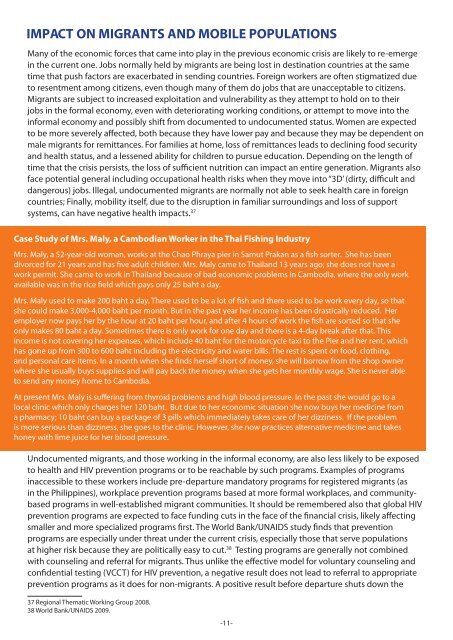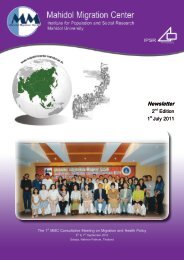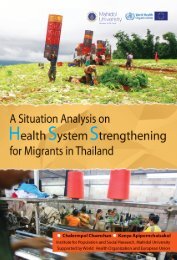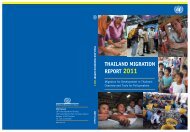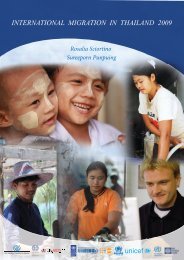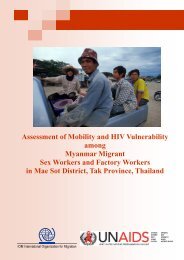Fulltext - Mahidol Migration Center - Mahidol University
Fulltext - Mahidol Migration Center - Mahidol University
Fulltext - Mahidol Migration Center - Mahidol University
You also want an ePaper? Increase the reach of your titles
YUMPU automatically turns print PDFs into web optimized ePapers that Google loves.
IMPACT ON MIGRANTS AND MOBILE POPULATIONSMany of the economic forces that came into play in the previous economic crisis are likely to re-emergein the current one. Jobs normally held by migrants are being lost in destination countries at the sametime that push factors are exacerbated in sending countries. Foreign workers are often stigmatized dueto resentment among citizens, even though many of them do jobs that are unacceptable to citizens.Migrants are subject to increased exploitation and vulnerability as they attempt to hold on to theirjobs in the formal economy, even with deteriorating working conditions, or attempt to move into theinformal economy and possibly shift from documented to undocumented status. Women are expectedto be more severely affected, both because they have lower pay and because they may be dependent onmale migrants for remittances. For families at home, loss of remittances leads to declining food securityand health status, and a lessened ability for children to pursue education. Depending on the length oftime that the crisis persists, the loss of sufficient nutrition can impact an entire generation. Migrants alsoface potential general including occupational health risks when they move into “3D’ (dirty, difficult anddangerous) jobs. Illegal, undocumented migrants are normally not able to seek health care in foreigncountries; Finally, mobility itself, due to the disruption in familiar surroundings and loss of supportsystems, can have negative health impacts. 37Case Study of Mrs. Maly, a Cambodian Worker in the Thai Fishing IndustryMrs. Maly, a 52-year-old woman, works at the Chao Phraya pier in Samut Prakan as a fish sorter. She has beendivorced for 21 years and has five adult children. Mrs. Maly came to Thailand 13 years ago; she does not have awork permit. She came to work in Thailand because of bad economic problems in Cambodia, where the only workavailable was in the rice field which pays only 25 baht a day.Mrs. Maly used to make 200 baht a day. There used to be a lot of fish and there used to be work every day, so thatshe could make 3,000-4,000 baht per month. But in the past year her income has been drastically reduced. Heremployer now pays her by the hour at 20 baht per hour, and after 4 hours of work the fish are sorted so that sheonly makes 80 baht a day. Sometimes there is only work for one day and there is a 4-day break after that. Thisincome is not covering her expenses, which include 40 baht for the motorcycle taxi to the Pier and her rent, whichhas gone up from 300 to 600 baht including the electricity and water bills. The rest is spent on food, clothing,and personal care items. In a month when she finds herself short of money, she will borrow from the shop ownerwhere she usually buys supplies and will pay back the money when she gets her monthly wage. She is never ableto send any money home to Cambodia.At present Mrs. Maly is suffering from thyroid problems and high blood pressure. In the past she would go to alocal clinic which only charges her 120 baht. But due to her economic situation she now buys her medicine froma pharmacy; 10 baht can buy a package of 3 pills which immediately takes care of her dizziness. If the problemis more serious than dizziness, she goes to the clinic. However, she now practices alternative medicine and takeshoney with lime juice for her blood pressure.Undocumented migrants, and those working in the informal economy, are also less likely to be exposedto health and HIV prevention programs or to be reachable by such programs. Examples of programsinaccessible to these workers include pre-departure mandatory programs for registered migrants (asin the Philippines), workplace prevention programs based at more formal workplaces, and communitybasedprograms in well-established migrant communities. It should be remembered also that global HIVprevention programs are expected to face funding cuts in the face of the financial crisis, likely affectingsmaller and more specialized programs first. The World Bank/UNAIDS study finds that preventionprograms are especially under threat under the current crisis, especially those that serve populationsat higher risk because they are politically easy to cut. 38 Testing programs are generally not combinedwith counseling and referral for migrants. Thus unlike the effective model for voluntary counseling andconfidential testing (VCCT) for HIV prevention, a negative result does not lead to referral to appropriateprevention programs as it does for non-migrants. A positive result before departure shuts down the37 Regional Thematic Working Group 2008.38 World Bank/UNAIDS 2009.-11-


